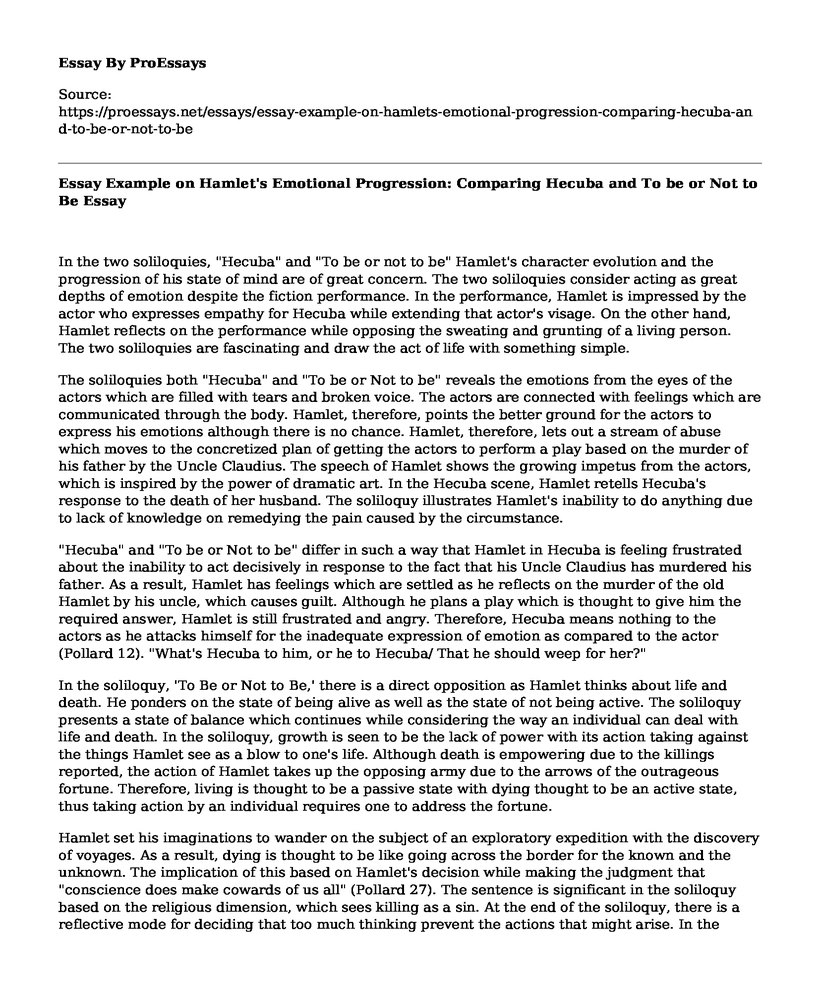In the two soliloquies, "Hecuba" and "To be or not to be" Hamlet's character evolution and the progression of his state of mind are of great concern. The two soliloquies consider acting as great depths of emotion despite the fiction performance. In the performance, Hamlet is impressed by the actor who expresses empathy for Hecuba while extending that actor's visage. On the other hand, Hamlet reflects on the performance while opposing the sweating and grunting of a living person. The two soliloquies are fascinating and draw the act of life with something simple.
The soliloquies both "Hecuba" and "To be or Not to be" reveals the emotions from the eyes of the actors which are filled with tears and broken voice. The actors are connected with feelings which are communicated through the body. Hamlet, therefore, points the better ground for the actors to express his emotions although there is no chance. Hamlet, therefore, lets out a stream of abuse which moves to the concretized plan of getting the actors to perform a play based on the murder of his father by the Uncle Claudius. The speech of Hamlet shows the growing impetus from the actors, which is inspired by the power of dramatic art. In the Hecuba scene, Hamlet retells Hecuba's response to the death of her husband. The soliloquy illustrates Hamlet's inability to do anything due to lack of knowledge on remedying the pain caused by the circumstance.
"Hecuba" and "To be or Not to be" differ in such a way that Hamlet in Hecuba is feeling frustrated about the inability to act decisively in response to the fact that his Uncle Claudius has murdered his father. As a result, Hamlet has feelings which are settled as he reflects on the murder of the old Hamlet by his uncle, which causes guilt. Although he plans a play which is thought to give him the required answer, Hamlet is still frustrated and angry. Therefore, Hecuba means nothing to the actors as he attacks himself for the inadequate expression of emotion as compared to the actor (Pollard 12). "What's Hecuba to him, or he to Hecuba/ That he should weep for her?"
In the soliloquy, 'To Be or Not to Be,' there is a direct opposition as Hamlet thinks about life and death. He ponders on the state of being alive as well as the state of not being active. The soliloquy presents a state of balance which continues while considering the way an individual can deal with life and death. In the soliloquy, growth is seen to be the lack of power with its action taking against the things Hamlet see as a blow to one's life. Although death is empowering due to the killings reported, the action of Hamlet takes up the opposing army due to the arrows of the outrageous fortune. Therefore, living is thought to be a passive state with dying thought to be an active state, thus taking action by an individual requires one to address the fortune.
Hamlet set his imaginations to wander on the subject of an exploratory expedition with the discovery of voyages. As a result, dying is thought to be like going across the border for the known and the unknown. The implication of this based on Hamlet's decision while making the judgment that "conscience does make cowards of us all" (Pollard 27). The sentence is significant in the soliloquy based on the religious dimension, which sees killing as a sin. At the end of the soliloquy, there is a reflective mode for deciding that too much thinking prevent the actions that might arise. In the soliloquy, it is clear that life is burdensome and as Hamlet gives as a list that annoys his life is seen to be devoid of power as based on things such as the oppressors and the pangs of despised love.
Work Cited
Pollard, Tanya. "What's Hecuba to Shakespeare? * ." Renaissance Quarterly, 2012, doi:10.1086/669345.
Cite this page
Essay Example on Hamlet's Emotional Progression: Comparing Hecuba and To be or Not to Be. (2023, Feb 23). Retrieved from https://proessays.net/essays/essay-example-on-hamlets-emotional-progression-comparing-hecuba-and-to-be-or-not-to-be
If you are the original author of this essay and no longer wish to have it published on the ProEssays website, please click below to request its removal:
- Essay Example on A Rose for Emily: A Murder or a Suicide?
- Compare and Contrast Essay the Odyssey vs the Inferno
- Essay Example on 1984: A Vision of a Dystopian Future With Technological Control
- Jane Austen's Pride and Prejudice Essay Example
- Critical Essay Sample on Role of Women in a Brave New World
- Literary Analysis Essay on Robert Frost's Classic Stopping by Woods on Snowy Evening: Ambiguity Abounds
- Essay Example on the Role of Learning in Middlemarch







